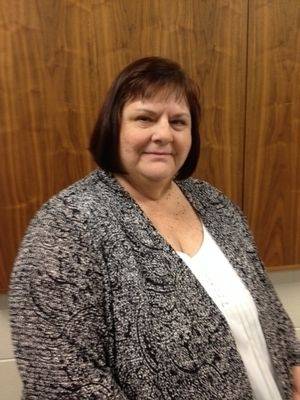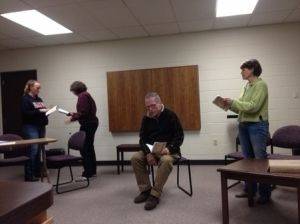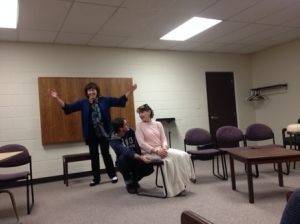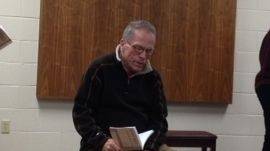
Family dramas always make for good drama. At least in theory. When done badly — and I’ve seen them done badly—they amount to a handful of people who are supposed to seem related, standing around, shouting at each other. When they’re done well — and I’ve seen them done very well — they are searing reminders of how much people need each other and how badly the people we claim to love can hurt us and vice versa.
Kay Bohannon Holley directs family dramas very, very well.
In fact, she directs most everything well, as patrons of the Station Theatre can attest. In addition to past productions like Edward Albee’s Three Tall Women and Who’s Afraid of Virginia Woolf?, she has, in recent years, delivered such powerful works as John Kolvenbach’s Love Song and Gina Gionfriddo’s Becky Shaw. [Full disclosure: I performed in both of those last two shows, so I’m not an unbiased reporter; but that’s exactly why I think it’s an event when I know Kay Holley is going to direct a play about a family in crisis.]
 This Thursday, she will harness her talent for making a living room into a pressure cooker when Other Desert Cities, a new play by Jon Robin Baitz, hits the Station stage. Other Desert Cities, which I read immediately upon its publication and was lucky enough to see when it played Chicago’s Goodman Theatre last spring, is a smart, funny play about a family with secrets and grudges that swings between tense and tender with disarming elasticity.
This Thursday, she will harness her talent for making a living room into a pressure cooker when Other Desert Cities, a new play by Jon Robin Baitz, hits the Station stage. Other Desert Cities, which I read immediately upon its publication and was lucky enough to see when it played Chicago’s Goodman Theatre last spring, is a smart, funny play about a family with secrets and grudges that swings between tense and tender with disarming elasticity.
I spoke with Holley as she wrapped up her off-site rehearsal period (where this article’s photos were taken). The interview that follows here is part of a longer, more in-depth conversation that I’ve been having with her for a little while now about her background, her love of theatre, and her history with the Station in particular. The extended text of that conversation will appear in Smile Politely’s companion publication, Bonfire. For now, though, let’s stick to the show at hand.
———
Smile Politely: The reasons for you to want to direct this play would seem numerous. I mean, it’s a great script from a long-established playwright; and it’s a living-room play, which puts it right in your wheelhouse. Are there other things that drew you to it?
Kay Holley: I may have over-emphasized the “living-room play” thing. I’ve directed plays that are not living room plays per se. Almost, Maine was not, nor were An Almost Holy Picture, or Wit, or even Copenhagen. But it can’t be denied that I am attracted to people in conversation, working out their conflicts, idiosyncrasies, passions, and pains by talking. The layers and levels of drama that emerge from a group of people talking amazes and delights me. Other Desert Cities embodies that in spades. I was also drawn to the particular family drama that is at its heart: the power of silence in a family, the question of who owns a family’s stories.
SP: You couldn’t have a better cast for this one. Steve Keen and Carolyn Kodes-Atkinson (playing a pair of Hollywood marrieds in their golden years) have such history with the Station, as does Joi Hoffsommer, who I can imagine will be riotous as Carolyn’s wildcard sister. And of course Joel Higgins has become a recent fixture after his turn in Sons of the Prophet and his directing turn with White People. Among such a group of heavy hitters, the one actor with whom audiences might not be familiar is your lead, Kate Riley. What can you tell us about her and her history with the Station?
 Holley: Kate graduated from the U of I Theatre acting program around 1994. She has been doing theatre and then teaching drama in various places around the country since. Marriage and family brought her back to Urbana fairly recently. Kate is the daughter of a veteran Celebration Company member (Karma Ibsen) and herself a Company member of some 20 + years. I remember her most vividly in Shakespeare here at the Station. She was glorious in A Midsummer Night’s Dream and The Taming of the Shrew. It is great to have her back on our stage.
Holley: Kate graduated from the U of I Theatre acting program around 1994. She has been doing theatre and then teaching drama in various places around the country since. Marriage and family brought her back to Urbana fairly recently. Kate is the daughter of a veteran Celebration Company member (Karma Ibsen) and herself a Company member of some 20 + years. I remember her most vividly in Shakespeare here at the Station. She was glorious in A Midsummer Night’s Dream and The Taming of the Shrew. It is great to have her back on our stage.
SP: Asking “what was the rehearsal process like” is kind of lame, since it’s understood that it involves a lot of blocking and memorization, but those who don’t participate in theatre might not realize what else goes on. What else has this show’s process involved?
Holley: Golly, our blocking rehearsals alone ended up taking three weeks. Not because of complicated blocking, but because we spent so much time analyzing, questioning, talking. We’re dealing with a family here who have crucial things that they don’t talk about–so just figuring out who knows what can be tricky. The play’s timeline is interesting–the time in the play jumps from 2004 to the present, but the span of time that informs the characters and their interactions ranges from the 50s on. There was a lot to talk about. We have a really good cast–their creation of this family is a kind of alchemy that is very exciting to watch.
 SP: You’ve stated previously that you like to let the show take shape organically rather than come at it with a “concept” in mind. Has this show grown in any directions that surprised you?
SP: You’ve stated previously that you like to let the show take shape organically rather than come at it with a “concept” in mind. Has this show grown in any directions that surprised you?
Holley: What has surprised me is how much more I like the play now than when I first read it. Rehearsals are revealing new levels to me all the time. A good deal of this comes from the thoughtful work of these talented and seasoned actors. As so often happens — the actors are helping me “find” the play. And the more we discover, the more interesting I find it. The key will be to create a performance that reveals the richness of the play for an audience in just one sitting. If we can do that, it might just be electrifying.
———
To make reservations for Other Desert Cities at the Station Theatre, visit their website or call (217) 384-4000. The play will run three weeks, from April 24–May 10. All shows begin at 8 p.m.








